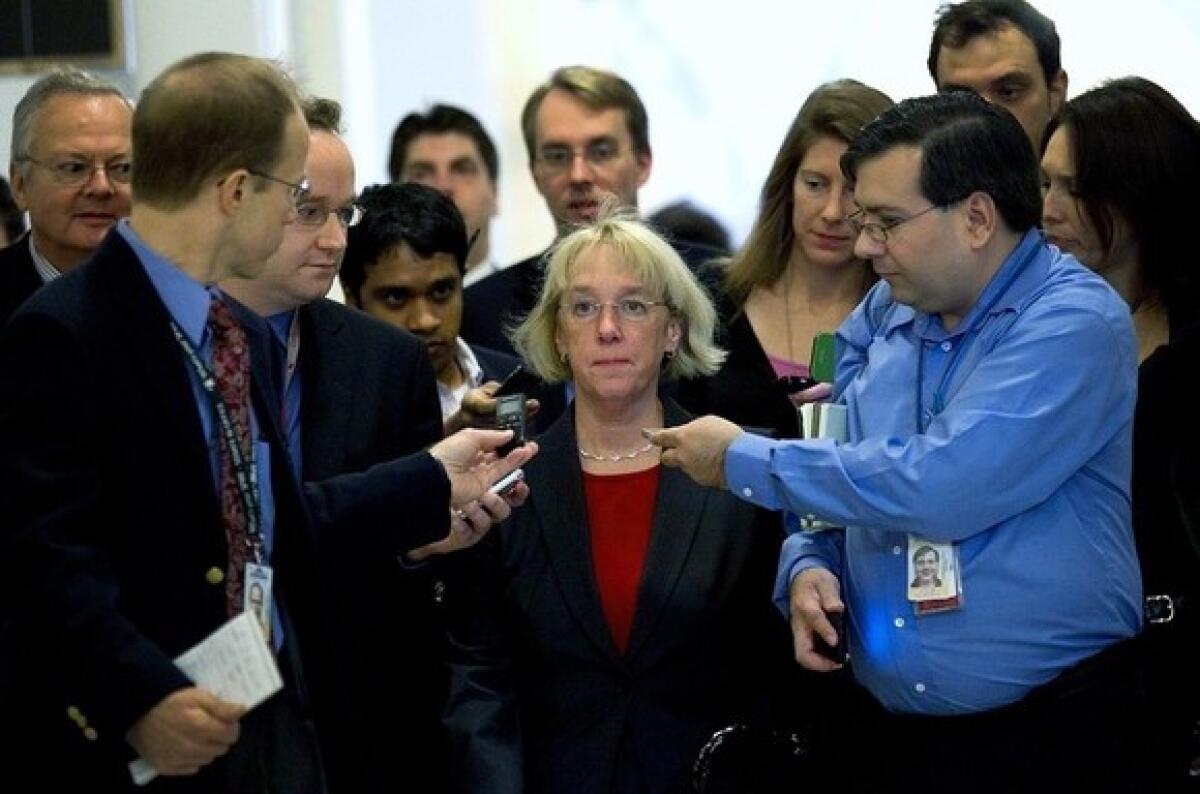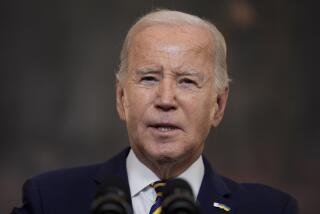Super committee fails to agree on deficit-reduction plan

- Share via
Unable to break the partisan stalemate over taxes and Medicare, the congressional “super committee” came to a quiet close as the co-chairs issued a statement saying no deal could be reached by the panel’s deadline.
“We have come to the conclusion today that it will not be possible to make any bipartisan agreement available to the public before the committee’s deadline,” said the statement from Sen. Patty Murray (D-Wash.) and Rep. Jeb Hensarling (R-Texas).
The end had been expected as it became clear in recent days that final rounds of talks would not be able to break the impasse.
Leaders apparently calculated that the risk of failure was not as damaging as agreeing to a deficit reduction plan that would require serious compromise heading toward the 2012 election. Now, voters will decide the tax and spending debate next year.
With congressional approval ratings at all-time lows, even the threat of a further erosion of public opinion was not enough to push leaders to compromise. They sought to construct an endgame that preserved as much of a sense of comity as possible after months of work.
“Despite our inability to bridge the committee’s significant differences, we end this process united in our belief that the nation’s fiscal crisis must be addressed and that we cannot leave it for the next generation to solve. We remain hopeful that Congress can build on this committee’s work and can find a way to tackle this issue in a way that works for the American people and our economy,” the co-chairs wrote in a statement released after the U.S. financial markets closed. “We are deeply disappointed that we have been unable to come to a bipartisan deficit reduction agreement.”
Already, lawmakers outside of the panel were discussing ways to pick up where the super committee left off, with a bipartisan “gang of six” senators considering plans to continue their work on a sweeping deficit reduction plan and others saying Congress should vote on various proposals that have been forwarded by independent fiscal commissions.
“Now is the time for a bipartisan rebellion of members of Congress to come together,” said Sen. Joe Lieberman (I-Conn.), who called for a year-end vote on any one of the those proposals. “Show that elected officials in Washington are capable of protecting the economic future of the American people.”
The committee faced a Wednesday deadline to vote on a proposal to slash the nation’s deficits by $1.5 trillion over the decade. The panel that was brought into existence as a result of the summer debt ceiling fight spent three months in mostly secret negotiations. A deal needed to be posted by Monday evening to provide a 48-hour review.
But Republicans and Democrats were unable to compromise on the tax and spending issues that have divided Congress all year, punting the debate to next year’s presidential and congressional campaigns.
Republicans refused to substantially raise taxes and wanted to cut federal deficits largely by reducing spending on Medicare and other domestic programs. Democrats wanted a more equal balance of new taxes and spending cuts -- a level of taxation the GOP could not accept.
A focal point in final days became the George W. Bush-era tax cuts, which are scheduled to expire in December 2012. Republicans wanted to extend those tax breaks for the wealthy and other Americans, rather than carve into that source of new revenue. Most Republican members of Congress have signed an anti-tax pledge with conservative activist Grover Norquist, and were hesitant to agree to new taxes.
The failure of the committee now triggers mandatory spending cuts that slice equally across defense and discretionary accounts, to begin in January 2013.
But because those cuts will not happen until later, many in Congress hope they can be undone. And with the financial markets signaling there would not be a severe economic upheaval if the committee failed, the urgency for the panel, made up of six Democrats and six Republicans from the House and Senate, and their congressional leaders, appeared to diminish.
In the year ahead, voters will decide which approach they prefer.
Defense hawks have said they will seek to undo the Pentagon cuts.
“I will be introducing legislation in the coming days to prevent cuts that will do catastrophic damage to our men and women in uniform and our national security,” Rep. Howard P. “Buck” McKeon (R-Santa Clarita), chairman of the Armed Services Committee. “Our military has already contributed nearly half a trillion to deficit reduction.”
More to Read
Get the L.A. Times Politics newsletter
Deeply reported insights into legislation, politics and policy from Sacramento, Washington and beyond. In your inbox twice per week.
You may occasionally receive promotional content from the Los Angeles Times.











